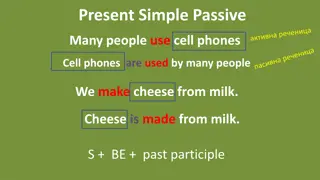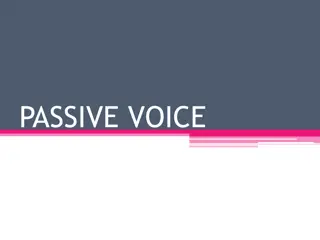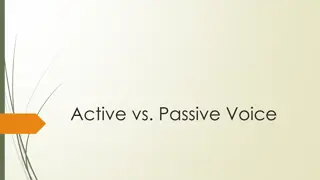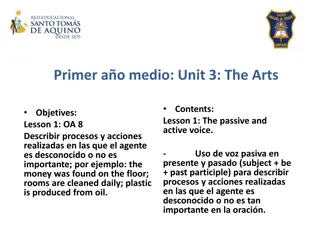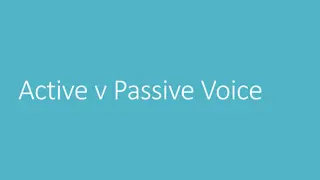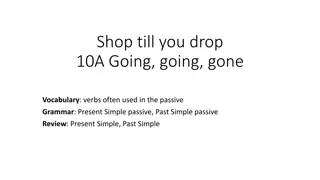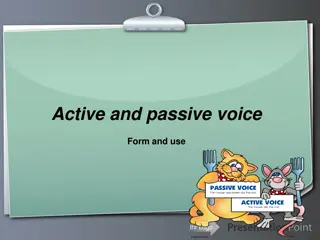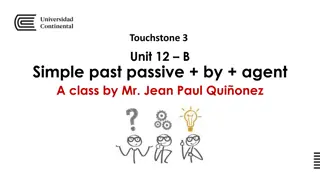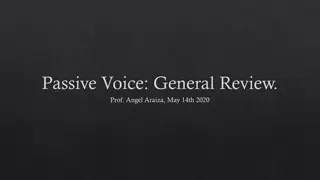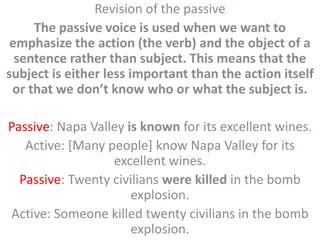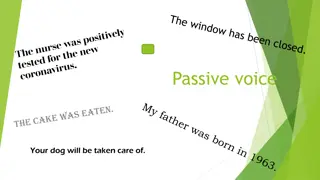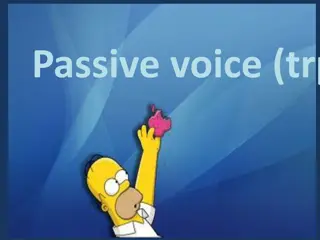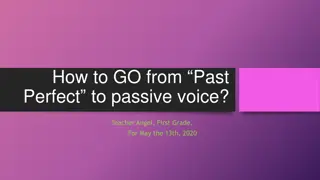Exploring the Passive Voice in English Language
The passive voice is used in English to shift the focus from the subject of a sentence to the object. It is commonly used when the agent of the action is unknown, to avoid responsibility or blame, and to enhance cohesion and coherence in writing. By starting sentences with given information and maintaining consistency in subject usage, the passive voice can make texts more coherent and structured. This linguistic concept is extensively covered in Pearson's Gold Experience 2nd Edition B2+.
Download Presentation

Please find below an Image/Link to download the presentation.
The content on the website is provided AS IS for your information and personal use only. It may not be sold, licensed, or shared on other websites without obtaining consent from the author. Download presentation by click this link. If you encounter any issues during the download, it is possible that the publisher has removed the file from their server.
E N D
Presentation Transcript
How and why do we use the passive voice in comparison to the active? Let s look at: Common reasons why we use the passive voice. The passive voice and cohesion/coherence. The passive voice in different forms. 1. 2. 3. Common uses of the passive voice... Pearson (c) 2018 Gold Experience 2nd Edition B2+
Function: Common uses of the passive Tim s house was broken into last week and no one has been arrested yet. I know, but didn t you hear? The police said the door hadn t been locked! Look at girl 1 and the sections in bold. Do we know who broke into the house? Do you think girl 2 knows who didn t lock the door? Who usually arrests people for crimes? Look at girl 2. Who do you think was responsible for not locking the door? Does girl 1 ever mention who broke in or the police? Yes. No. The police. No. Tim. Pearson (c) 2018 Gold Experience 2nd Edition B2+
Function: Common uses of the passive We don t know who broke in. Use 1: When the agent is unknown, obvious or is unimportant. It s obvious we are talking about the police. Tim s house was broken into last week and no one has been arrested yet. The speaker doesn t want to point blame at the person (Tim) who left the door unlocked, so avoids mentioning him. Use 2: To avoid talking of responsibility or blame. I know, but didn t you hear? The police said the door hadn t been locked! Notice how the passive voice can be in all tenses and structures. More on this later... Pearson (c) 2018 Gold Experience 2nd Edition B2+
Function: Cohesion and Coherence The passive voice can help a text be more cohesive and coherent. Look at these examples. Maria has fallen over and broken her leg! She has been taken to the hospital where she will be operated on. Don t worry! I ve read about the doctors there. They were all trained at the best universities. To be coherent, we often start a clause with previously given information. E.g. the object of the previous clause becomes the subject of the next. We can use the passive voice to do this. Look at what the boy says. The subject is the same in all of the clauses. Who is the subject? Which of the clauses are passive? Look at what the girl says and find an example of this. Do you think using the same subject makes the text more or less consistent? 1. She has been taken she will be operated on... Maria I ve read about the doctors. They were all trained... 2. More Pearson (c) 2018 Gold Experience 2nd Edition B2+
Function: Cohesion and Coherence Use 3: To make texts more consistent by starting clauses with the same subject. The same subject. Maria has fallen over and broken her leg. She has been taken to the hospital where she will be operated on. The passive voice helps us do this. Use 4: To make texts more coherent by always starting a sentence with given information. The object of clause 1 becomes the subject of clause 2. Don t worry! I ve read about the doctors there. They were all trained at the best universities. Pearson (c) 2018 Gold Experience 2nd Edition B2+
Form: How do we make the passive? Complete the table with the correct boxes. Tim s house was broken into. Which part of the structure changes depending on the tense? No one The door She They has been hadn t been will be were arrested. locked. operated on. trained. Verb to be Auxiliary verb to be Subject Past participle Pearson (c) 2018 Gold Experience 2nd Edition B2+
Form: How do we make the passive? subject auxiliary verb to be past participle Notice how the verb to be changes depending on the tense. Tim s house was broken into. No one The door She They has been hadn t been will be were arrested. locked. operated on. trained. by a friend. The main verb is always in the past participle. In the passive voice, the subject is not the agent (i.e. the person/thing doing the action). In order to mention the agent we can add by after the past participle. future simple past perfect past simple present perfect Time to practise... Pearson (c) 2018 Gold Experience 2nd Edition B2+
Practice activities Change these sentences from the active to the passive voice. You don t need to mention the agent. 1. The ambulance took her to the hospital last night. She was taken to the hospital last night. 2. The headmaster has spoken to Ariana about her behaviour. Ariana has been spoken to about her behaviour. 3. Everyone at the party had eaten all the cake before Jude arrived. All the cake had been eaten before Jude arrived. Read the text and try to make it more coherent by starting sentences with given information. School leavers face a number of difficult challenges. However, they can overcome many of these challenges by simply talking to a school counsellor. Courses train the school counsellors to listen to students and give advice. Students might accept this advice or not, but the most important thing is the process of discussing future options. School leavers face a number of difficult challenges. However, many of these challenges can be overcome by simply talking to a school counsellor. School counsellors are trained to listen to students and give advice.This advice might be accepted or not, but the most important thing is the process of discussing future options. Pearson (c) 2018 Gold Experience 2nd Edition B2+




